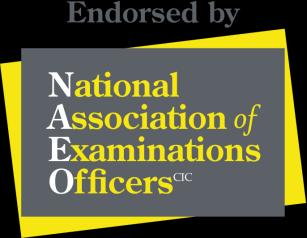

A student guide to exams
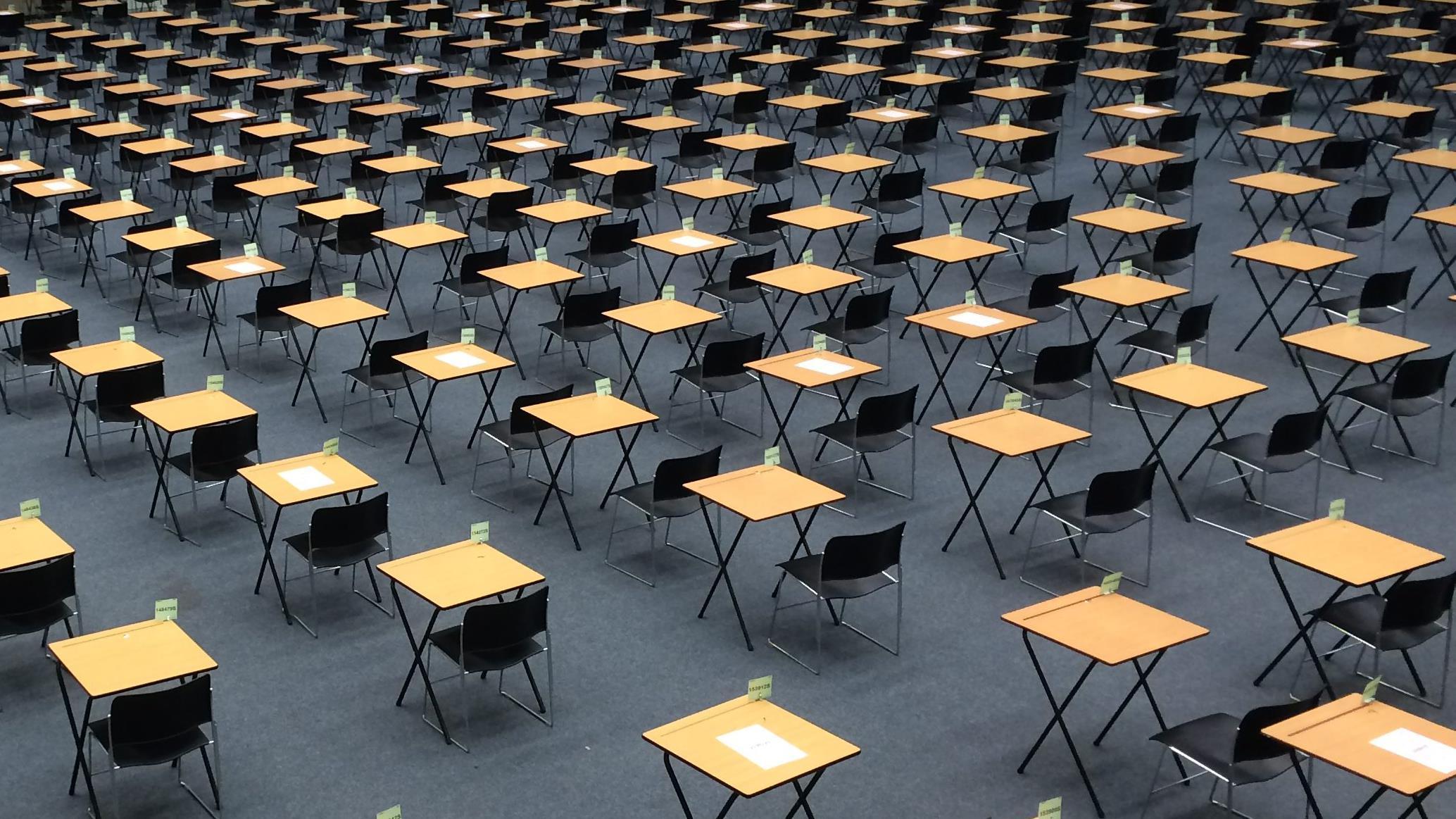
2025/2026 academic year


Areas covered

▪ Your exam entries
▪ Contingency day
▪ Social media
▪ The exam room
▪ What to do if you are late for your exam
▪ What to do if you are ill on the exam day
▪ Access arrangements
▪ Exam room posters
▪ Exam conditions

▪ The role of the invigilators
▪ Drink bottles
▪ Unauthorised materials
▪ Using calculators
▪ Emergency evacuation of the exam room
▪ Malpractice
▪ Leaving the exam room
▪ Results
▪ Enquiring about your results
▪ Certificates

Exam regulations
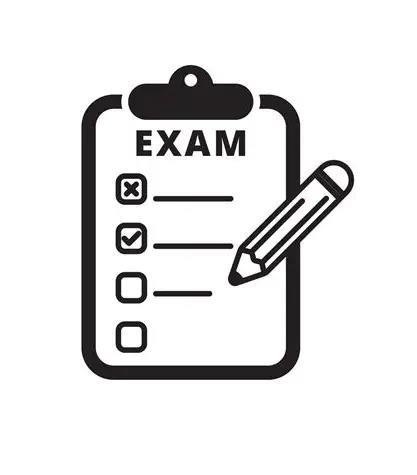
Before the exam
You need to know which exams you have been entered for, and when they take place

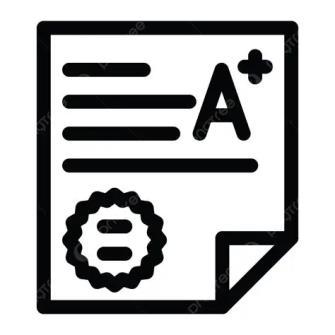
During the exam
You need to know the rules you need to follow in the exam room
After the exam
You need to know when and how you will receive your results, and what to do if you think an error might have been made with your grade(s)
The awarding bodies have a set of rules which all candidates must follow when taking their exams

Exam entries
You will be provided with information about the exams you are taking in the form of a Candidate
Statement of Entry and an Exam Timetable
Entry information
Tell the exams officer if… Exam day arrangements Be aware of… Exam clashes Ensure that…
You think you have been entered for an incorrect exam
You have not been entered for an exam which you think you should be sitting
Your personal details are incorrect
The date of your exams You check your timetable for any exam clashes
The time of your exams Your exams officer explains what happens if you have two or more exam papers timetabled at the same time
The rooms in which your exams will be taking place
You ask your exams officer if you are unsure what to do if you have a timetable clash

Contingency day: 24 June 2026
▪ Until you have completed all of your examinations, you must make sure that you are available on 24 June 2026
▪ This is the contingency day in the event of national or significant local disruption to examinations in the United Kingdom
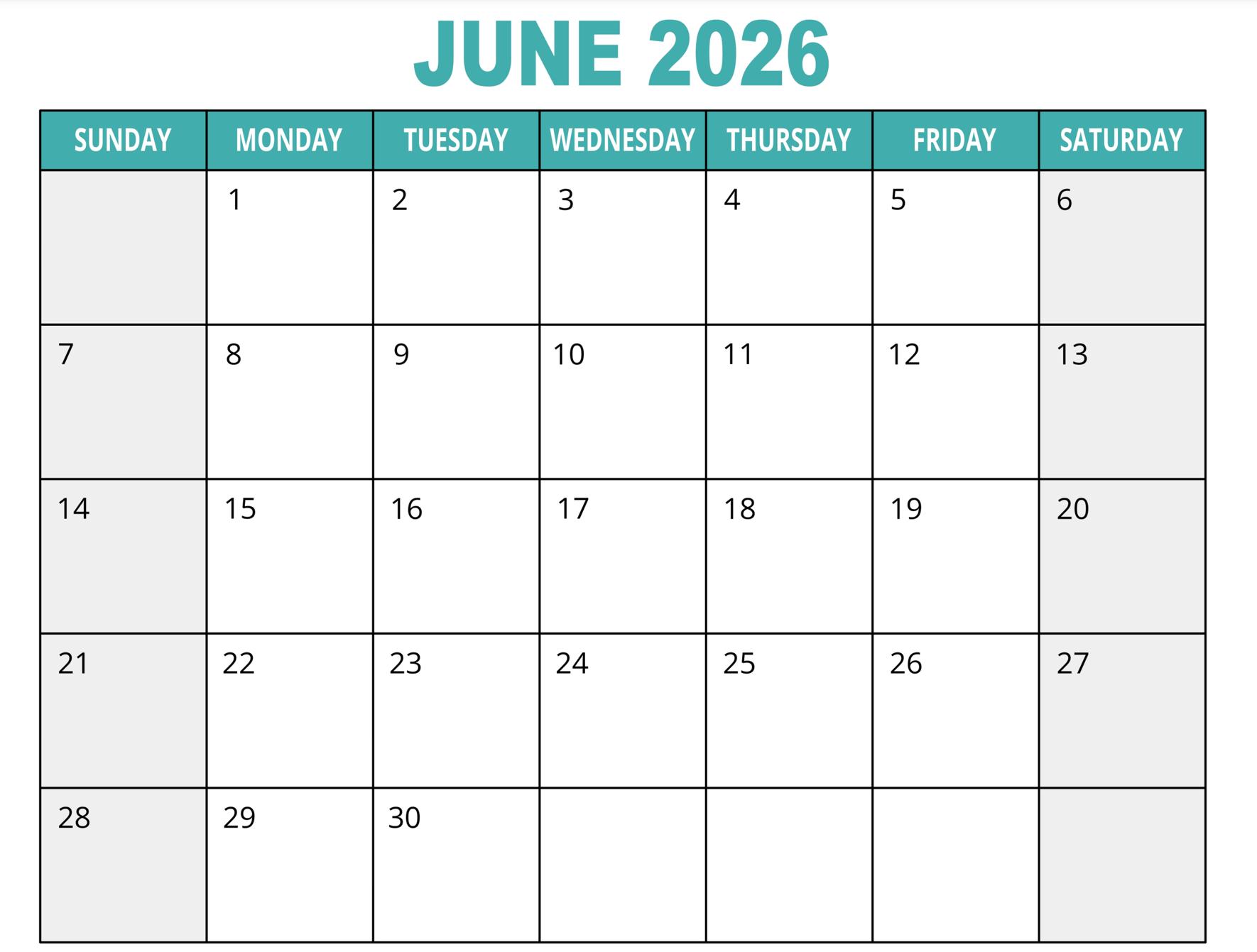

Social media document
Do not:
▪ Buy/ask for/share exam or assessment content
▪ Pass on rumours of what’s in exams or assessments
▪ Share your work
▪ Work with others so that your assessment is not your own independent work
If you do, you may:
▪ Receive a written warning
▪ Lose marks
▪ Be disqualified from a part of or all of your qualifications
▪ Be banned from taking exams and assessments for a number of years
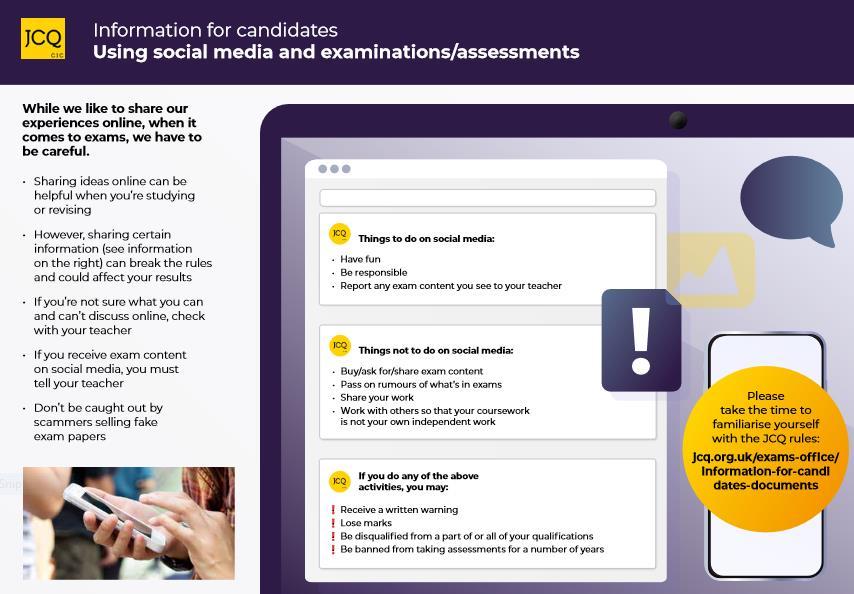

The exam day
Before you take your exams, your must be aware of…
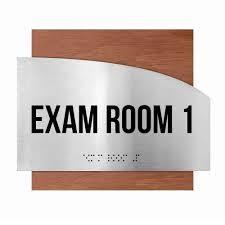
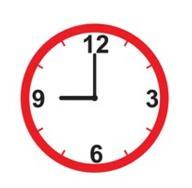

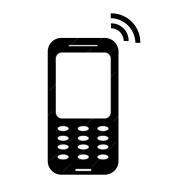
The room(s) in which your exams will be taking place
The time each of your exams will be starting (and finishing)
Where you will be seated during each exam
Where your personal belongings will be kept, for example your bag, mobile phone etc.

What you must do if you are late for an exam
Step 1: Telephone the centre and ask to speak with the exams officer
Step 2: Follow the instructions given by the exams officer
Step 3: Turn off your mobile phone and any other communication device
Step 4: When you arrive at the centre go to reception and explain that you are late and that you need to see the exam officer immediately
Step 5: Your exams officer will give you the full instructions for the exam, and answer any questions, before you are allowed to begin your exam
You must be on time for all of your exams
However, if you are/you think you will be late for an exam, follow these five steps

What you must do if you are ill on the day of an exam
Step 1: Telephone the centre and ask to speak with the exams officer
If you are feeling unwell on the day of an exam, follow these steps
Step 2: Follow the instructions given by the exams officer
Step 3: Try and get some evidence to prove your illness (e.g. a doctor’s note)
Step 4: If you have 2 exams on the same day you MUST call before both exams if you will not make it

Access arrangements
▪ You will be informed ahead of the exam of how your access arrangement(s) will be delivered on the day of the exam
▪ Before the start of the exam, the invigilator will ask you to check that you have the expected access arrangement(s) and that if there is a problem, to put up your hand to attract the invigilator’s attention
▪ Access arrangements could include:
o Extra time
o Reader/computer reader
o Scribe/speech recognition technology
o Supervised rest break

Exam room posters: Unauthorised items
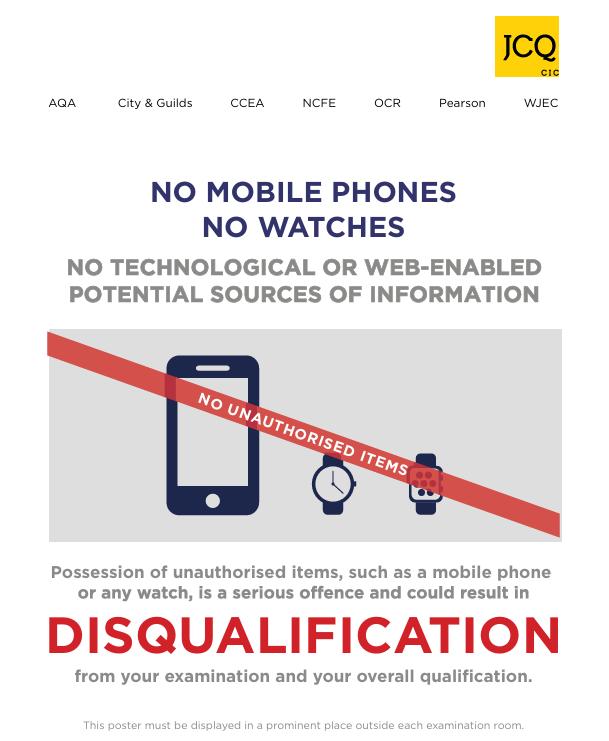
You are not allowed to bring the following into the exam room as they are potential technological/web enabled sources of information:
▪ Earphones or earbuds (e.g. AirPods)
▪ Mobile phones
▪ MP3/4 players or similar devices
▪ Smart glasses
▪ Tablets (e.g, iPads or iPods)
▪ Watches
▪ Any other smart devices

Exam room posters: Warning to candidates
In particular, note the following:
▪ Possession of a mobile phone, even if you do not use it, is not allowed and may be subject to penalty, including possible disqualification
▪ You are under formal exam conditions from the the moment you enter the room in which you will be taking your examination(s) until the point at which you are permitted to leave
▪ You must follow the instructions of the invigilator
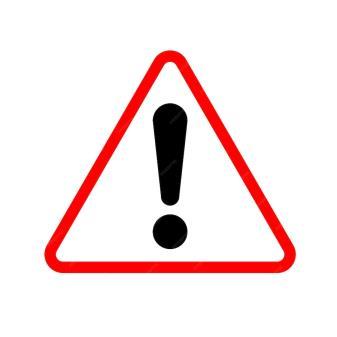
Remember:
If you do not follow these instructions, you are committing malpractice
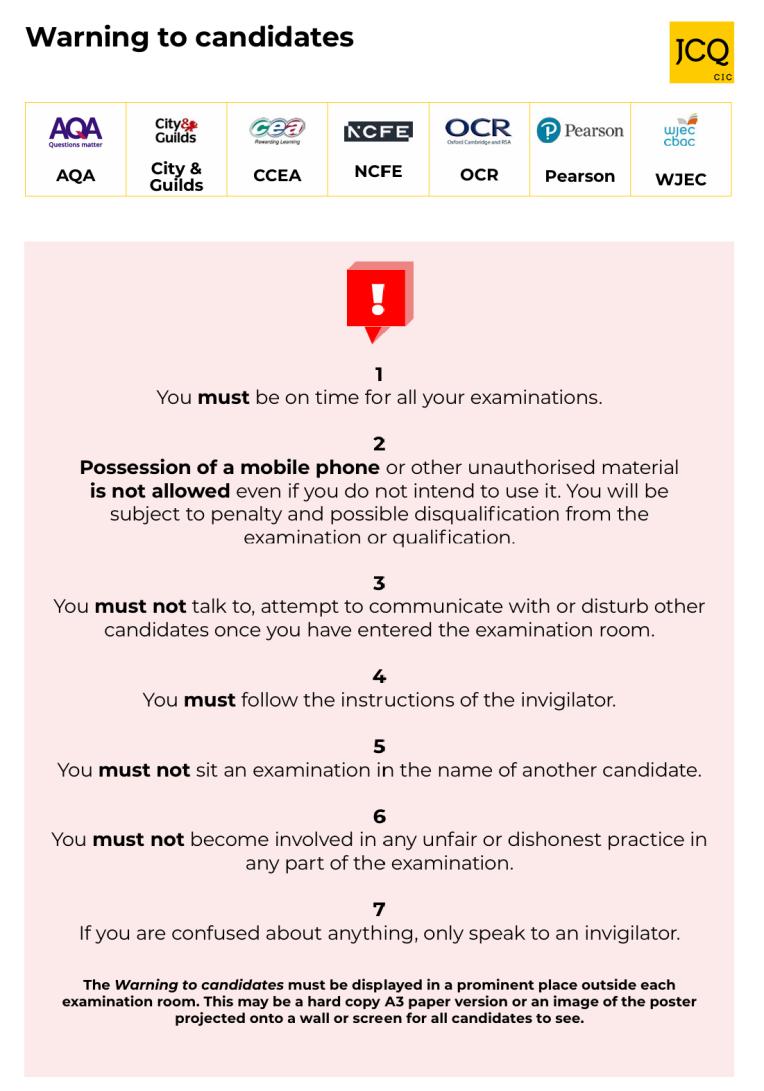

Formal examination conditions
▪ Formal examination conditions are:
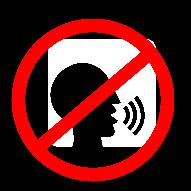
No talking to other candidates
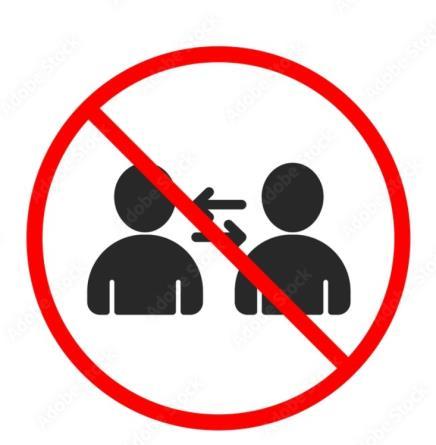
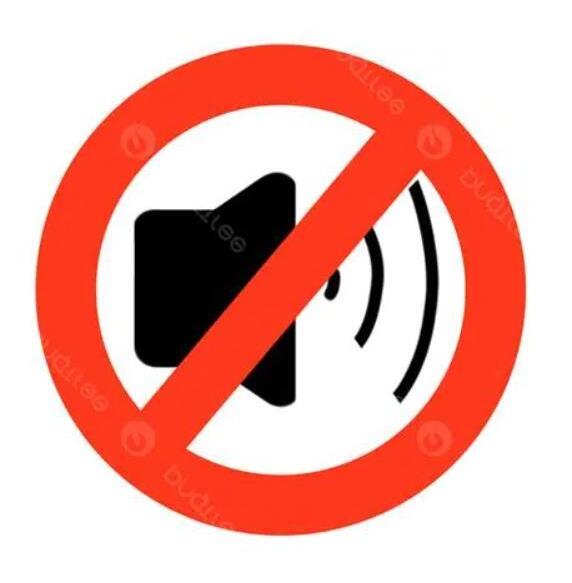
No disturbing other candidates No communicating with other candidates
▪ You are under formal examination conditions from the moment you enter the exam room until the point at which you are permitted to leave
▪ If you talk to, communicate with, or disturb other candidates as you enter the exam room, you will be reported to the awarding body who will decide whether to penalise you which may include disqualification

The role of the invigilators
▪ Each exam room will have at least one invigilator
▪ The invigilators are following the rules set by the awarding bodies
▪ Invigilators will record any irregular incidents which occur in the exam room (e.g. if someone feels unwell, requires the toilet or falls asleep, etc.)
▪ If you behave in a suspicious manner the invigilator will approach you and ask you to stop
▪ If you misbehave, the invigilator will warn you that you may be removed from the exam room
▪ You are committing malpractice if you do not follow the invigilator’s instructions, and you will be reported to the awarding body

Remember:
If you do not follow these instructions, you are committing malpractice


Instructions for candidates
At the time of your exam(s)
• You must not enter the exam room until invited to do so by the invigilator/authorised member of staff
• You are under formal examination conditions (no talking or attempting to communicate with or disturbing another candidate) from the moment you enter the room in which you will be taking your exam(s) until the point at which you are permitted to leave
• You must listen to and follow the instructions given to you by the invigilator at all times
• The centre number, subject title and paper code, the actual starting and finishing times, and date, of each exam will be clearly displayed and visible to you in the exam room, as well as the clock(s)
Before you are permitted to start your exam(s), the invigilator will:
• make sure you are seated according to the set seating arrangements
• tell you that you must now follow the regulations of the exam
• ask you to check that you have been given the correct question paper for the day, date, time, subject, unit/component (and tier of entry, if appropriate) and to put up your hand if you think you have been given the wrong question paper
• tell you to read the instructions on the front of the question paper
• ask you to check that you have all the materials you need for the exam
• tell you about any erratum notices (if applicable) and instruct you about emergency procedures
• where applicable, ask you to check that you have the expected access arrangement(s)
The invigilator will also remind you that you must:
• hand in any unauthorised items in your possession (this includes mobile phones and watches) if you have not already done so
• (This is your final chance. Failure to do so must be reported to the awarding body and may lead to disqualification)
• fill in all the details needed on the front of your answer booklet (or question paper) in black ink
• make sure you fill these details in on any additional answer sheets that you use
• write clearly and in black ink, but you may use pencil for drawings and rough notes
• write in the designated sections of the answer booklet
• write all rough work in your answer booklet and neatly cross it through with a single line (for multiple-choice papers, you must do any rough work in the question booklet)
• The invigilator will also remind you that you must not use correcting pens, fluid or tape, erasable pens, blotting paper and you must not use highlighters or gel pens in your answers.
The invigilator will:
• remind you that you must not communicate in any way with, ask for help from or give help to another candidate while you are in the exam room
• tell you when you may complete the details on the front of your answer booklet (You must only do this when the invigilator’s announcement is made)
• tell you when you may open the question paper and begin to write your answers
• tell you the time allowed (the duration) of your paper(s)
The invigilator is not allowed:
• to give you any information or answer any questions from you about the content of your exam paper unless it relates to the instructions on the front of the question paper
• to give you any indication of the time elapsed or remaining for you to complete your exam paper

Drink bottles
▪ Drink bottles must be transparent with all labels removed
▪ This includes transparent, reusable plastic bottles


The invigilator may ask you to take off the lid if this is large enough to hide notes

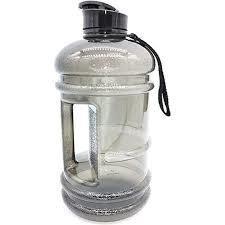

Unauthorised materials
▪ The following are defined as unauthorised materials and items and cannot brought into the exam room:
Notes (including those in the wrong format or prohibited annotations), study guides and personal organisers
An unauthorised memory stick Notes, or revision data, enclosed within or written on the pages of a bilingual dictionary
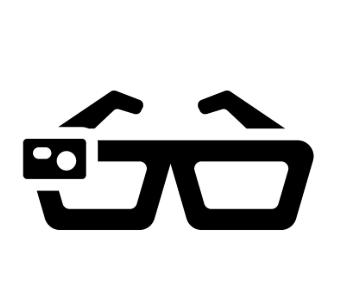
Smart glasses

(e.g. iPads, iPods)
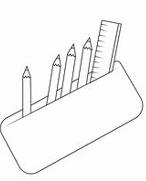
Pencil cases which are not see-through

Earphones/earbuds (e.g. AirPods)
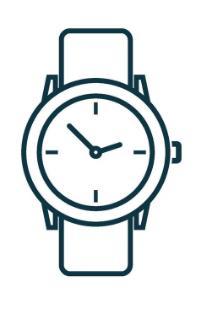
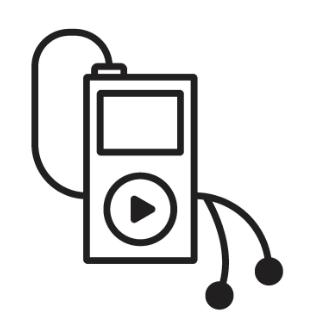
MP3/4 players or similar devices
Any other smart devices (e.g. smart watches)
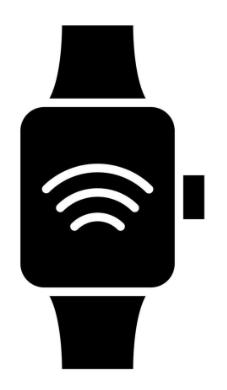

Watches
Tablets
Mobile phones
Using calculators
During an exam, a calculator must not give access to pre-stored information or facilities. This includes:
Databanks
Dictionaries
Mathematical formulae
Text
Language translators
Symbolic algebra manipulation
Symbolic differentiation or integration
Communication with other machines or the internet
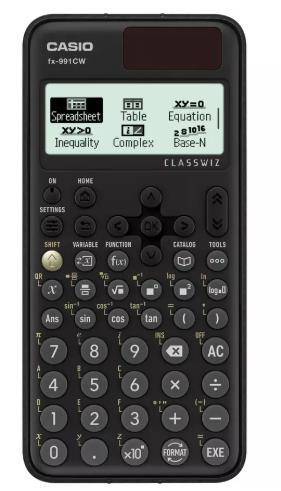
It is the responsibility of candidates for making sure that their calculators meet the awarding bodies’ regulations
The instructions on the question paper will say whether calculators are allowed or not. If the instructions do not include such a statement, calculators should be treated as standard equipment and may be used by candidates
Your Maths teacher will explain how a calculator can/cannot be used in an exam
A calculator must not be borrowed from another candidate during an examination, but an invigilator may give a candidate a replacement calculator

Emergency evacuation of the exam room
If there is an emergency, such as a fire alarm, the exam room will be evacuated
This video shows how your invigilators are instructed to evacuate the exam room
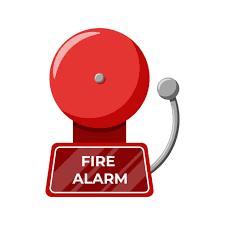
You must follow the invigilator’s instructions

Malpractice
Offence Warning
Bringing notes in the wrong format or prohibited annotations into the exam room
Notes/annotations go beyond what is permitted but do not give an advantage; content irrelevant to subject
Loss of marks on that paper
Notes/annotations are relevant and give an unfair advantage
Loss of marks on all papers in that subject
Notes/annotations introduced in a deliberate attempt to gain an advantage
Mobile phone or similar electronic devices (including iPod, MP3/4 player, memory sticks, smartphone, smartwatch, AirPods, earphones and headphones)
Not in the candidate’s possession but makes a noise during the examination
In the candidate’s possession but no evidence of being used by the candidate
In the candidate’s possession and evidence of being used by the candidate

Malpractice
Offence Warning
A breach of the instructions or advice of an invigilator, supervisor, or the awarding body in relation to the exam rules and regulations
Minor non-compliance:
e.g. sitting in a nondesignated seat; continuing to write for a short period after being told to stop
Loss of marks on that paper
Major non-compliance:
e.g. refusing to move to a designated seat; significant amount of writing after being told to stop
Loss of marks on all papers in that subject
Repeated non-compliance
Disruptive behaviour in the examination room or assessment session (including use of offensive language)
Minor disruption lasting a short time; calling out, causing noise, turning around
Repeated or prolonged disruption; unacceptably rude remarks; being removed from the exam room; taking another’s possessions
Warnings ignored; provocative or aggravated behaviour; repeated or loud offensive comments; physical assault on staff or property

Malpractice
Offence Warning
The inclusion of offensive or obscene material in scripts, controlled assessments, coursework, non-examination assessments or portfolios
Isolated offensive words or drawings
Loss of marks on that paper
Frequent offensive words or drawings; isolated obscenity or offensive comments directed at an individual or group
Loss of marks on all papers in that subject
Frequent obscenities; discriminatory language, remarks or drawings directed at an individual or group
Copying from another candidate or allowing work to be copied (including the misuse of technology)
Lending work not knowing it would be copied
Permitting examination script/work to be copied; showing other candidates’ answers
Copying from another candidate’s script, controlled assessment, coursework, nonexamination assessment; borrowing work to copy

Leaving the exam room temporarily
• You must raise your hand to get the attention of an invigilator
• You may only leave the room when the invigilator says it is ok to do so (they may need to wait for another member of staff to arrive
• The lead invigilator will record the time you stopped working and the time you started again. This time will be added on to the end of your exam
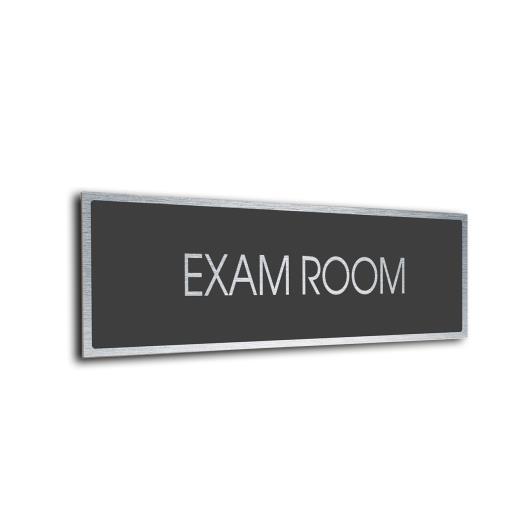
• When outside of the exam room, you must be accompanied at all times
• You must not communicate with anyone in person or using technology when outside of the exam room

Leaving before the end of your extra time
▪ If you have been granted extra time and you do not wish to use it, you will only be able to leave after you have signed to confirm that it is your decision to leave the exam room and that you cannot return for this exam. If you use your extra time, you must stay until the end of your allocated extra time.
▪ If you do not use your extra time on a regular basis, you could possibly lose this arrangement for your remaining exams
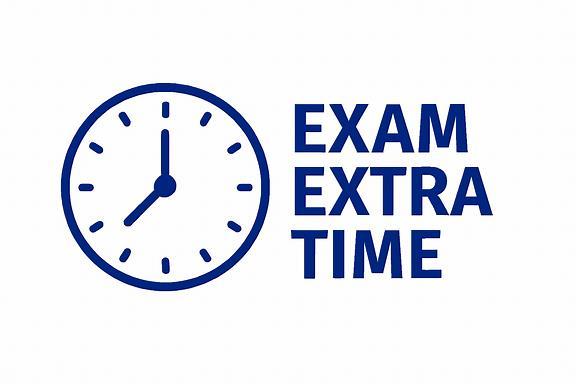

Results
• Results day is on Thursday 20th August 2026
• You will be invited into school in the morning to collect your results
• Members of SLT and teaching staff will be onsite to celebrate your successes and offer support if required
• Any results not collected in person will be sent by first class post that afternoon
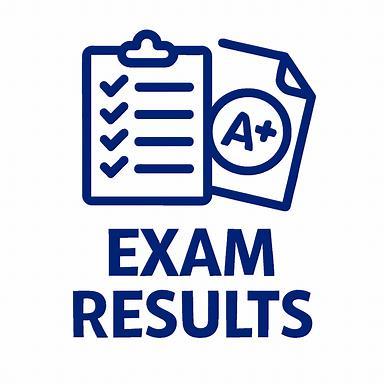

Reviewing your result(s): Your options
Access to scripts Service 1: A clerical re-check Service 2: Review of marking Service 3: Review of moderation
This allows you and your teacher to view your exam script before deciding whether an enquiry about your result(s) should be submitted to the awarding body
This includes a check that:
▪ all parts of your script (your answers) have been marked
▪ marks have been totalled and recorded correctly
This includes:
▪ a review of the original marking to ensure that the mark scheme was applied correctly, and to correct any errors
▪ a check that all parts of your script (your answers) have been marked, and that marks have been totalled and recorded correctly
This applies to non-examination assessments and coursework and includes a review of the original moderation and sample of candidates’ work to ensure that the assessment criteria was applied fairly, reliably and consistently (this service is not available to individual candidates)

Requesting a post-results service
• Following your results, you may with to request a Review of Marking (RoR) or Access to Scripts (ATS)
• The RoR is NOT a remark. This will review if the mark scheme has been applied correctly
• If a grade is changed, this will be the final grade, whether it goes up or down
• You must discuss with a member of SLT before a RoR is submitted
• A charge may be applied
• You may wish to submit a ATS request if you are retaking an exam or to check before you submit a RoR
• You will receive a copy of your exam paper
• This is a free of charge service

Certificates
• Certificates will be ready to be collected in November (date TBC)
• You will be informed of the date from which you can collect them from QEHS by e-mail
• Certificates must be collected in person unless specifically requested by you for a third party to collect them
• A form to request a third party to collect them will be sent out with the details of when they will be available. The person collecting the results must bring this form, signed by the candidate, along with photo ID before the certificates will be handed over.


Questions
For more information, please see below:
Exams Officer: Ms Mitchell gmitchell@tcat.school
Assistant Head for Exams, Data and Reporting: Mrs Watkiss mwatkiss@tcat.school
Exams Admin: qehsexams@tcat.school

